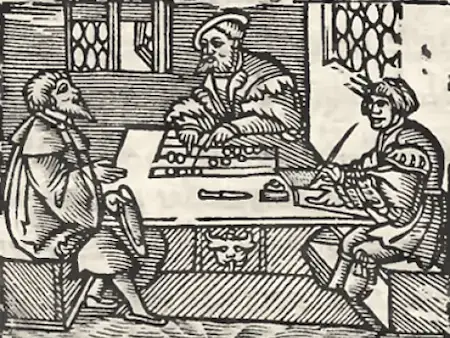To do something hugger-mugger is to do it in secret; in a clandestine manner.
Hugger-mugger
What's the meaning of the phrase 'Hugger-mugger'?
What's the origin of the phrase 'Hugger-mugger'?
Hugger-mugger, which is found in early citations in many different spellings – hucker-mucker, hoker-moker, hocker-mocker etc., is now archaic and is rarely heard, despite it being in common use in Tudor England.
We can’t now be certain that these are all variants of the same expressions although, given the casual phonetic approach to spelling in the 16th century, it is highly likely. A good example of this carefree attitude towards spelling is the fact that there are only six known examples of Shakespeare’s signature – all of them different, and none of them Shakespeare:
Willm Shakp
William Shaksper
Wm Shakspe
William Shakspere
Willm Shakspere
William Shakspeare
The earliest known usage of hugger-mugger is in John Skelton’s play Magnyfycence, which was presented at the Henry VIII’s court in 1519:
Thus is the talkyng of one and of oder
As men dare speke it hugger-mugger.
Thomas More used the hukermoker spelling in 1529.
Given the level of intrigue at Henry’s court the term hugger-mugger had good reason to be commonplace. Every drama and historical record of Tudor England centres around men conspiring in secret.
The source of the phrase is unknown. Reduplicated phrase like hugger-mugger often have an active word which supplies the meaning and a rhyming secondary word which adds emphasis, for example, okey-dokey and lovey-dovey.
This expression differs from those in that hugger and mugger have the same meaning, that is, concealment. Middle English word mokere meant ‘to hoard up, conceal’. Hugger was used by itself by Abraham Fleming in 1576, also to mean concealment. It may be that this was a contraction of hugger-mugger or it may be that hugger already had that meaning and hugger-mugger was formed from two words with the same meaning.
Hugger-mugger appears to have been a spelling variant of the earlier phrase hoder-moder, which has the same meaning. This is known from the 15th century onward, for example, in the Paston Letters, 1461:
“He and hys wyfe and other have blaveryd here of my kynred in hoder-moder.”
See other reduplicated phrases.
The history of “Hugger – mugger” in printed materials
Trend of hugger – mugger in printed material over time
Related phrases and meanings
Browse more Phrases
About the Author

Phrases & Meanings
A-Z
A B C D E F G H I J K L M N O P Q R S T UV W XYZ
Categories
American Animals Australian Bible Body Colour Conflict Death Devil Dogs Emotions Euphemism Family Fashion Food French Horses ‘Jack’ Luck Money Military Music Names Nature Nautical Numbers Politics Religion Shakespeare Stupidity Entertainment Weather Women Work
How did we do?
Have you spotted something that needs updated on this page? We review all feedback we receive to ensure that we provide the most accurate and up to date information on phrases.
